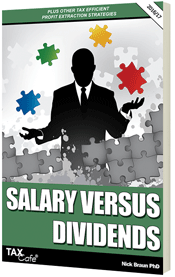Dividend Tax Basics
Company Directors - Salary or Dividends?
MANY company directors pay themselves a small tax-free salary and take the rest of their income as dividends.
For the new tax year starting on 6th April 2011, the personal allowance for most taxpayers is £7,475. This means you can take £7,475 in salary without having to pay any income tax.
The latest information can be found in our guide:
Salary versus Dividends
However, the other tax you have to watch out for is national insurance. As a company director you potentially face both employee’s national insurance (12% on small salaries over £7,225) and employer’s national insurance (13.8% on salaries over £7,075).
The optimal salary for most small company directors for 2011/12 is therefore £7,225.
(There will be a small amount of employer’s national insurance payable but your company can claim it as a tax deduction.)
Dividends
What about your dividends?
This is where it gets a bit more tricky. Dividends are taxed at either 0% (basic-rate taxpayers), 25% (higher-rate taxpayers), or 36.1% (income over £150,000).
For owners of small companies, with modest amounts of surplus cash, choosing the optimal dividend is fairly simple:
The basic-rate band for 2011/12 is £35,000. So, for the coming tax year you can take a salary of £7,225 and a tax-free cash dividend of £31,725. The cash dividend is the actual amount paid from the company to you.
The tax-free cash dividend is calculated as follows:
Basic-rate band: £35,000
Add remaining personal allowance: £250 (£7,475 - £7,225)
Gross dividend: £35,250
Less 10% dividend tax credit: £3,525
Cash dividend: £31,725
As a company owner you have to plan your dividend payments carefully to minimise the income tax payable, taking account of how your business has performed in the past AND how you expect it to perform in the future.
Example
Jonathan has £60,000 of retained profits from previous years sitting in the company bank account. During the 2011/12 tax year he pays himself a salary of £7,225 and the whole £60,000 as a cash dividend. The first £31,725 is tax free (see above) but the remaining £28,275 is taxed at 25%, resulting in an income tax bill of £7,069.
Now let’s say Jonathan’s company doesn’t make any profits in the next 2012/13 tax year and therefore cannot declare any dividends. Jonathan could have saved £7,069 in income tax by retaining £28,275 of profits in the company for an extra year and paying the cash out as a tax-free dividend in 2012/13. Jonathan has wasted his tax-free basic-rate band for the year.
Of course, Jonathan may have had non-tax reasons for paying the large dividend but the example illustrates why your dividend payments should take account of the future prospects of the business.
Further important points to note:
- Your company must have sufficient retained profits before dividends can be declared or paid.
- For companies owned by a husband and wife (or any other couple), the above tax-free amounts can be doubled.
- If you do not wish to extract cash from your company immediately, you can still declare tax-free dividends while you are a basic-rate taxpayer and pay them out at a later date.









